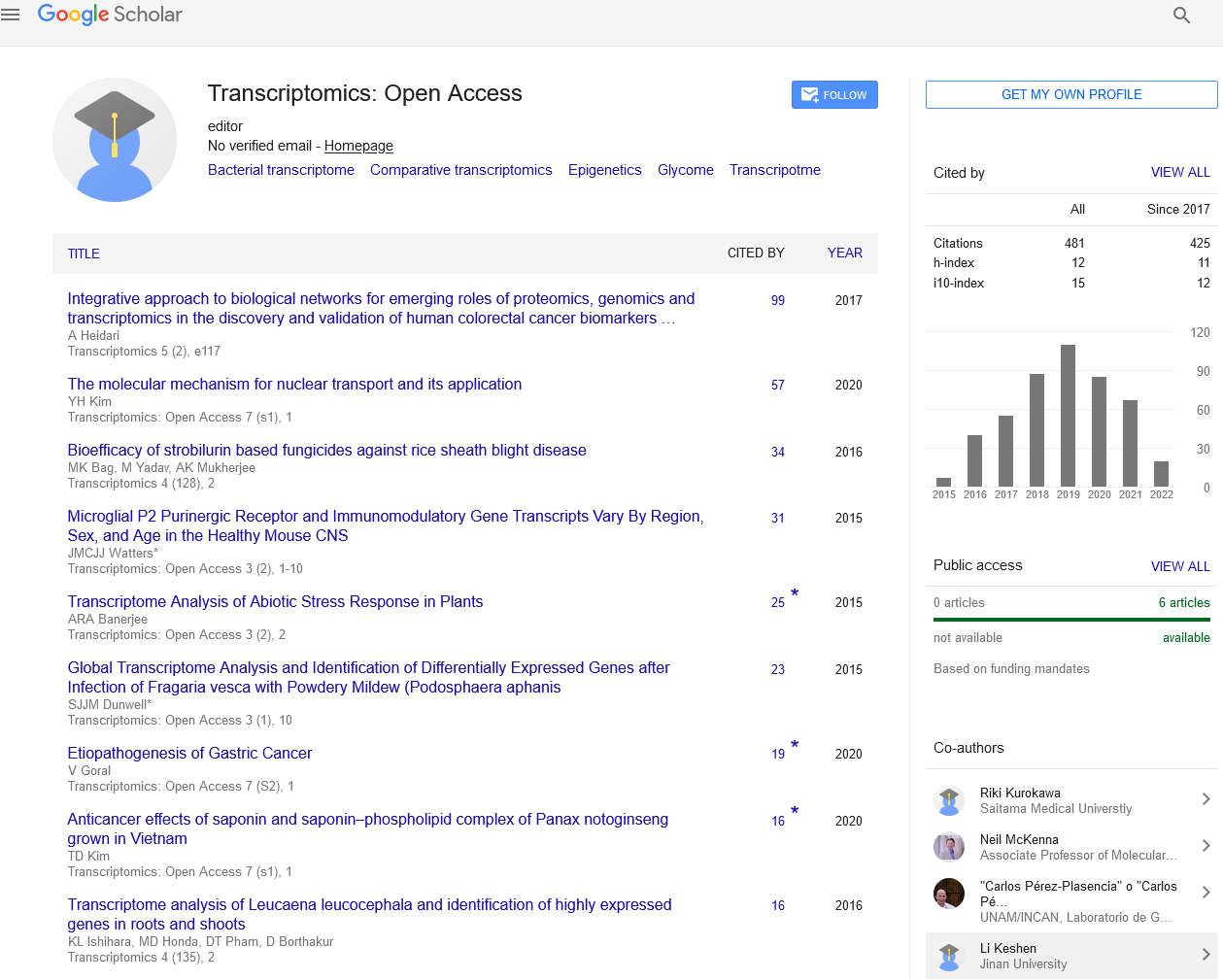Transcriptomics: Open Access : Citations & Metrics Report
Articles published in Transcriptomics: Open Access have been cited by esteemed scholars and scientists all around the world. Transcriptomics: Open Access has got h-index 13, which means every article in Transcriptomics: Open Access has got 13 average citations.
Following are the list of articles that have cited the articles published in Transcriptomics: Open Access.
| 2024 | 2023 | 2022 | 2021 | 2020 | 2019 | 2018 | 2017 | 2016 | 2015 | 2014 | 2013 | |
|---|---|---|---|---|---|---|---|---|---|---|---|---|
Total published articles |
30 | 32 | 30 | 25 | 24 | 0 | 2 | 4 | 14 | 28 | 6 | 6 |
Research, Review articles and Editorials |
0 | 2 | 1 | 10 | 5 | 0 | 1 | 1 | 9 | 17 | 5 | 6 |
Research communications, Review communications, Editorial communications, Case reports and Commentary |
14 | 40 | 30 | 16 | 8 | 0 | 1 | 2 | 5 | 11 | 1 | 0 |
Conference proceedings |
0 | 0 | 0 | 0 | 0 | 0 | 0 | 50 | 52 | 111 | 0 | 0 |
Citations received as per Google Scholar, other indexing platforms and portals |
42 | 58 | 67 | 78 | 96 | 113 | 96 | 67 | 57 | 6 | 2 | 3 |
| Journal total citations count | 552 |
| Journal impact factor | 2.08 |
| Journal 5 years impact factor | 4.98 |
| Journal cite score | 6.92 |
| Journal h-index | 13 |
| Journal h-index since 2019 | 11 |
Important citations (451)
Proteomic-based evaluation of nuclear transport of nls-tagged trastuzumab-emtansine with enhanced cytotoxic potency |
|
Protein-protein docking analysis reveals efficient binding and complex formation between the human nuclear transport proteins |
|
Interaction between the influenza replication machineries and the cellular nuclear import system |
|
Mechanisms and consequences of newcastle disease virus w protein subcellular localization in the nucleus or mitochondria |
|
Direct interaction of ?-catenin with nuclear esm1 supports stemness of metastatic prostate cancer |
|
Er?36–gper1 collaboration inhibits tlr4/nf?b-induced pro-inflammatory activity in breast cancer cells |
|
New pathogenic mechanisms in sca1 neurodegenerative disease revealed by the ataxin-1 interactome |
|
The nuclear transport protein importin-5: a promising target in oncology and virology |
|
Analysis of protein transport to the inner nuclear membrane |
|
Nuclear export inhibitor kpt-8602 synergizes with parp inhibitors in escalating apoptosis in castration resistant cancer cells |
|
Targeting strategies |
|
Artesunate inhibits intestinal tumorigenesis through inhibiting wnt signaling |
|
Rotavirus nsp1 inhibition of the interferon response by localization to the nucleus and disruption of pml nuclear bodies |
|
Synthetic monopartite peptide that enables the nuclear import of genes delivered by the neurotensin-polyplex vector |
|
A novel proteomic method reveals nls tagging of t-dm1 contravenes classical nuclear transport in a model of her2-positive breast cancer |
|
Mechanisms of human larp6 nuclear export |
|
Inhibition of xpo-1 mediated nuclear export through the michael-acceptor character of chalcones |
|
Progress in tumour-targeted drug delivery based on cell-penetrating peptides |
|
Polymeric delivery of therapeutic nucleic acids |
|
Biomolecular condensation drives leukemia caused by nup98-fusion proteins |
|
